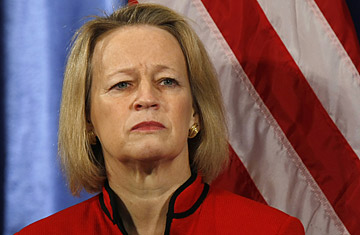
Mary Schapiro, Securities and Exchange Commission chief
(2 of 2)
Meanwhile, Schapiro has been trying to get a word in edgewise about her plan to fix the SEC. The initial actions were heard Friday in a speech at the Practising Law Institute in Washington. In what Schapiro calls her first two significant moves as chief, she is abolishing the agency's two-year-old failed "penalty pilot" experiment and dismantling a burdensome full-commission "pre-approval" process, which often delayed enforcement efforts "for weeks," she said. The announcements brought applause from the lawyers in attendance.
These first steps, she said, are part of her larger initiative to bring new "transparency and accountability" to all financial sectors, enact "vigorous prosecution" of those who have "cheated investors" and modernize the entire U.S. regulatory system. (See the top 10 financial collapses of 2008.)
Experts say it's a positive start but far from enough for an agency considered to be at the heart of restoring investor confidence in the U.S. financial system. "These are good first steps, but they aren't any silver bullet," said Bruce Carton, a former SEC enforcement officer and publisher of the securities-enforcement report the Securities Docket. "These are all bureaucratic obstacles that never should have been there in the first place. It will certainly expedite things, but it won't catch a Madoff." Real change, he said, "is all about putting more people in enforcement and training them."
The commission's "penalty pilot" program, Schapiro said, has caused "significant delays" and forced staffers to negotiate penalties with SEC commissioners prior to negotiating with the actual company. This, according to Schapiro, discouraged staffers from arguing for penalties and "sometimes resulted in reductions in the size of penalties imposed" against public companies that harmed investors.
The program kicked in once a case was completed and entered the monetary penalty phase. Prior to the program, SEC prosecutors would negotiate directly with wrongdoers, say, asking for $1 million in penalties and then negotiating down to $500,000. But since the program started, prosecutors had to first plead their case for penalties to SEC commissioners, who would negotiate up or down for wrongdoers in advance of direct negotiations for penalties.
"When the SEC needs to be deterring corporate wrongdoing, the 'penalty pilot' program sends the wrong message," Schapiro said.
As for the more rapid approval of formal investigation orders and commission permission slips, Schapiro is now allowing SEC enforcers to more easily move from informal investigations to securing subpoenas for witness testimony and documents by abolishing the agency's onerous "pre-approval" process. The process, which began at the beginning of all serious investigations, required all five SEC commissioners to be present and "pre-approve" any major investigation. The problem: it often took weeks before all the commissioners could come together in one room.
Schapiro's new system allows a single commissioner to approve investigations on behalf of the entire commission, which may take "a couple of days," she said. The change reinstitutes a policy that goes back to the Reagan Administration.
So is this real reform or déjà vu?
"She's doing everything prudently," said Coffee, "but she's not known as a big reformer. She's got close connections to industry and has always been in the financial industry."
Prior to joining the SEC, Schapiro was the highly paid chief executive officer of the Financial Industry Regulatory Authority (FINRA), a self-regulatory agency that also missed Madoff's scam. Upon leaving FINRA last month, Schapiro received a $7.2 million severance payment.
In a nod to "the people we serve," both big and small investors, Schapiro said she'll form a feedback group within the SEC called the Investor Advisory Committee. The committee's purpose, she said, is to hear "firsthand about the issues most concerning to investors."
"This has been done before — there have always been investor committees — but nothing dramatic ever comes of it," said Coffee.
The SEC did not comment on how this committee would operate or how investors would be invited to participate, but from the recently disclosed list of 13,500 Madoff victims, there are a few ready to give their two cents, which is all they can afford.
Robert Chew is a former investor with Madoff via a feeder fund. He lives in Colorado.
